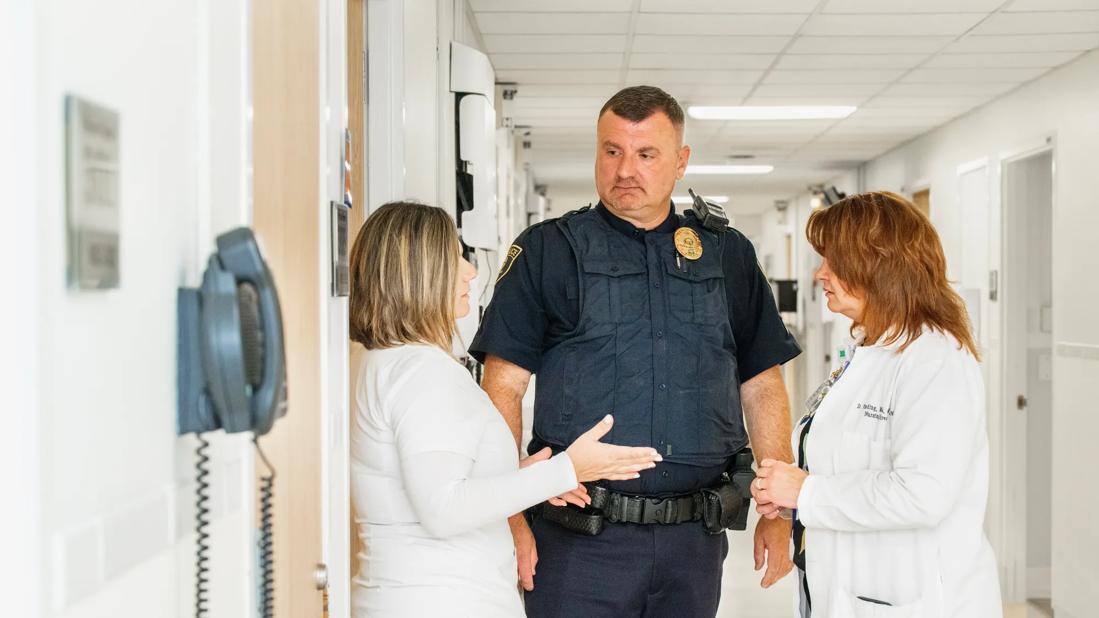Addressing a growing concern

A patient on a medical inpatient unit throws items off his food tray.
Advertisement
Cleveland Clinic is a non-profit academic medical center. Advertising on our site helps support our mission. We do not endorse non-Cleveland Clinic products or services. Policy
A patient recovering from surgery is out of bed, pacing in her room.
A patient in the emergency department (ED) is extremely agitated and making verbal threats.
How should a clinical nurse respond? It may depend on whether they are trained in behavioral health nursing — and today, few nurses outside of behavioral health units have this training.
Traditionally, caregivers of patients with behavioral health issues request consults from experts like Catherine Skowronsky, MSN, RN, ACNS-BC, CMSRN, Medicine Behavioral Health clinical nurse specialist consultant at Cleveland Clinic main campus. In recent years consults have become more frequent.
“Nurses everywhere — in medical-surgical units, ED and intensive care units (ICUs) — are seeing a greater need now,” says Skowronsky. “The more consults I do, the more I hear nurses say how uncomfortable they feel when caring for patients with behavioral health conditions. I came to realize that in-service consults that reach a few nurses at a time are not enough.”
A couple years ago, Skowronsky began thinking about how to train a greater number of nurses while still providing the hands-on bedside experience. That’s when she and clinical nurse specialist Deborah Solomon, MSN, RN, ACNS-BC, developed Cleveland Clinic’s two-day workshop “Communicating with Behavioral Health Patients for the Non-Behavioral Health Nurse.”
Since the program pilot in 2017, 50 nurses from Cleveland Clinic adult inpatient units have graduated, with many more requesting training. In 2019, the workshop will be available to all nurses across the Cleveland Clinic health system.
Advertisement
Nearly one in five U.S. adults lives with a mental illness, according to the National Institute of Mental Health. Based on research findings, these individuals are more likely to have chronic conditions and a greater symptom burden than those without a mental illness. It’s not so much if, but when, nurses outside of behavioral health units will care for patients with a mental illness, says Skowronsky.
At Cleveland Clinic Marymount Hospital, Chief Nursing Officer Barbara Zinner, DNP, MSN, RN, NE-BC, CENP, says vulnerable populations with behavioral health issues are more often seeking care in the ED. “They’re not necessarily coming in for psychiatric issues, but for other conditions,” she says. “When they’re not cleared to go to a psychiatric floor, they are transferred to a med-surg unit or ICU. Especially with today’s opioid crisis, we’ve had patients placed on a ventilator who exhibit disruptive behavior when coming out of a drug overdose.”
The opiate epidemic is just one of the reasons there is a need to increase behavioral health training, says Karen Hogan, DNP, RN, NEBC, Director of Behavioral Health at Marymount Hospital. Cultural stressors and more stringent criteria for hospitalizing patients in behavioral health units further underscore the need for training.
And caregivers shouldn’t assume that behavioral health issues affect only patients already diagnosed with a mental illness, says Janet Schuster, DNP, MBA, RN, NEA-BC, CPHQ, HACP, Chief Nursing Officer at Cleveland Clinic Lutheran Hospital. “Any patient coming in could experience anxiety requiring caregivers to have mental health awareness,” she says.
Advertisement
Lutheran and Marymount hospitals offer cross-training between behavioral health and other medical units (often through in-service support) and prepare nurses with de-escalation training. Skowronsky’s and Solomon’s two-day workshop goes deeper:
Nurses learn that when dealing with patients with behavioral health issues, establishing a relationship is paramount. “Patients need to trust that nurses are working for their good,” says Skowronsky. In addition, nurses learn the therapeutic value of setting limits.
“In nursing school, you’re taught to comfort patients and be caring at all times,” says Skowronsky. “But from a behavioral perspective, the best care is sometimes telling patients when their behavior is inappropriate, like when a patient throws something at you. We don’t just pick up the item and go on as if it didn’t happen. We say, ‘Throwing things is not acceptable. I want to listen to what you have to say and understand how you’re feeling.’”
Advertisement
Nurses also learn tactics for protecting themselves, such as standing within easy access to an exit when talking with an agitated patient, and proactively calming a patient who shows signs of rising stress.
“Keeping patients and caregivers safe is equally important,” says Zinner.
Skowronsky says the right training can help nurses feel better prepared to provide the proper care. “We know training is successful when nurses are no longer afraid to walk into patients’ rooms, and they feel confident that they can meet patients’ needs,” she says.
Advertisement
Advertisement

Planning continues with critical, patient-focused input from nursing teams

Strengthening care through targeted resources and frontline voices

Embracing generational differences to create strong nursing teams

CRNA careers offer challenge and reward

An unexpected health scare provides a potent reminder of what patients need most from their caregivers

Cleveland Clinic Abu Dhabi initiative reduces ICU admissions and strengthens caregiver collaboration

Veteran nurse blends compassion, cutting-edge transplant training and military tradition to elevate patient care

Embrace coaching and other tips to be a stronger leader